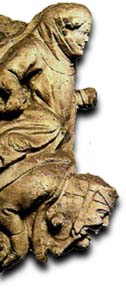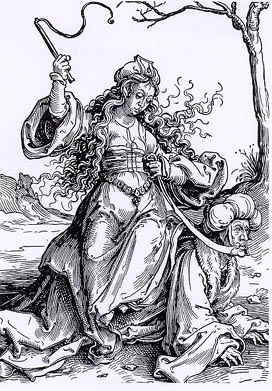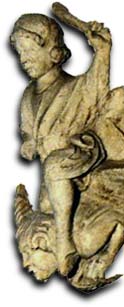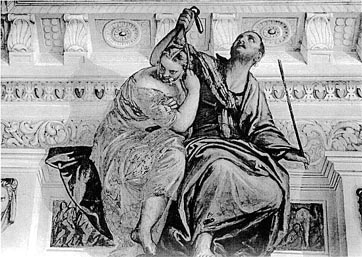 |
 |
 |
 |
 |
 |
 RISTOTLES,
cum doceret Alexandrum ut se contineret ab accessu frequenti uxoris suae,
quae erat pulcra valde, ne animum suum a communi providentia impediret,
et Alexander ei acquiesceret, hoc advertens regina et dolens, coepit Aristotelem
trahere ad amorem suum, quia multociens sola transibat cum pedibus nudis
et dissoluto crine, ut eum alliceret. RISTOTLES,
cum doceret Alexandrum ut se contineret ab accessu frequenti uxoris suae,
quae erat pulcra valde, ne animum suum a communi providentia impediret,
et Alexander ei acquiesceret, hoc advertens regina et dolens, coepit Aristotelem
trahere ad amorem suum, quia multociens sola transibat cum pedibus nudis
et dissoluto crine, ut eum alliceret.
Tandem allectus coepit eam sollicitare carnaliter, quae ait, "Hoc omnino non faciam, nisi videro signa amoris, ne me tentes: ergo veni ad meam cameram, reptando manibus et pedibus, sicut equus me portando, tunc scio quod non illudes mihi." Cui conditioni cum consensisset, illa intimavit hoc Alexandro; qui expectans
apprehendit eum reginam portantem. Quem cum vellet occidere, ait Aristotles
sic se excusando,
"Si sic accidit seni sapientissimo, ut a muliere deciperar, potes videre quod bene docueram te, quid accidere potest tibi juveni." Quod audiens rex, ei perpercit, et in doctrina eius profecit. |
 NCE
upon a time, Aristotle taught Alexander that he should restrain himself
from frequently approaching his wife, who was very beautiful, lest he should
impede his spirit from seeking the general good. Alexander acquiesed to
him. The queen, when she perceived this and was upset, began to draw Aristotle
to love her. Many times she crossed paths with him alone, with bare feet
and disheveled hair, so that she might entice him. NCE
upon a time, Aristotle taught Alexander that he should restrain himself
from frequently approaching his wife, who was very beautiful, lest he should
impede his spirit from seeking the general good. Alexander acquiesed to
him. The queen, when she perceived this and was upset, began to draw Aristotle
to love her. Many times she crossed paths with him alone, with bare feet
and disheveled hair, so that she might entice him.
At last, being enticed, he began to solicit her carnally. She says, "This I will certainly not do, unless I see a sign of love, lest you be testing me. Therefore, come to my chamber crawling on hand and foot, in order to carry me like a horse. Then I'll know that you aren't deluding me."When he had consented to that condition, she secretly told the matter to Alexander, who lying in wait apprehended him carrying the queen. When Alexander wished to kill Aristotle, in order to excuse himself, Aristotle says, If thus it happened to me, an old man most wise, that I was deceived by a woman, you can see that I taught you well, that it could happen to you, a young man."Hearing that, the king spared him, and made progress in Aristotle's teachings. |
The concept of the great chain of being gave the medieval mind a way of comparing things from different sections of the chain. This type of comparison goes back to Plato's Republic, where Plato uses the ideal state as a model for the way the properly balanced person should live. What happens in the macrocosm (universe) is reflected in the mesocosm (society) and microcosm (individual).
One popular set of such links was to compare the human dominance over
animals (especially the horse) to the husband's control of the wife and
the reason's control of passion.
| Macrocosm
(universe) |
Mesocosm
(society) |
Microcosm
(individual) |
|
|
|
|
If the stories of Phyllis and Aristotle and the Wife of Bath invert the proper hierarchy, we can see the proper relationship in the painting "La Virtu che frena il Vizio" ("Virtue Restrains Vice") by Veronese.
